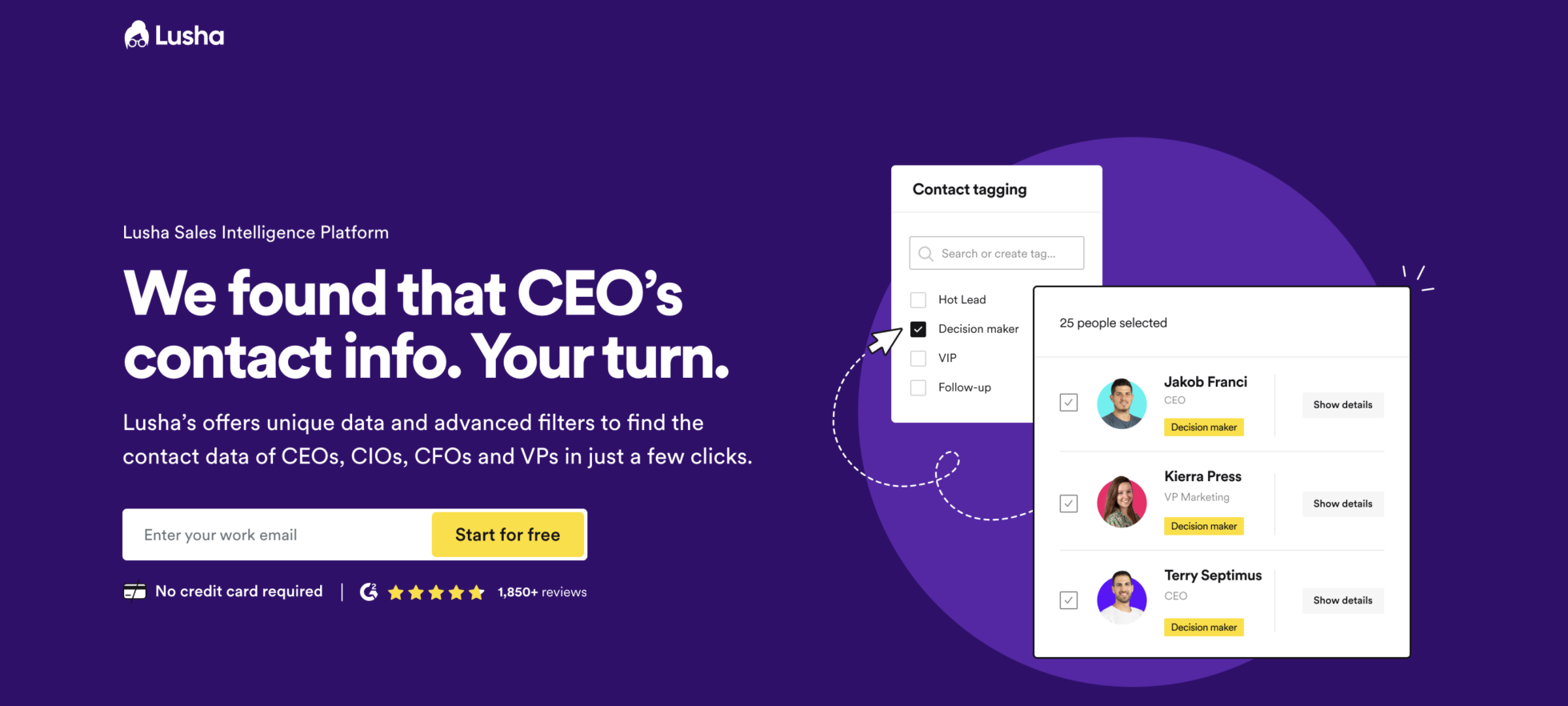Have you been using Lusha for your business needs? Finding it’s not everything you thought it would be? Don’t fret! There are plenty of Lusha alternatives on the market for you to sink your teeth into.
In this article, we’re gonna take a look at the top 5 Lusha competitors and see how each one fares against Lusha. In addition to that, we’re gonna recommend a super special sales tool that can complement Lusha or any of the Lusha alternatives you choose.
Firstly though, what is Lusha? What does it do, how does it work, and what are the benefits of using it?
Table of Contents
What is Lusha?
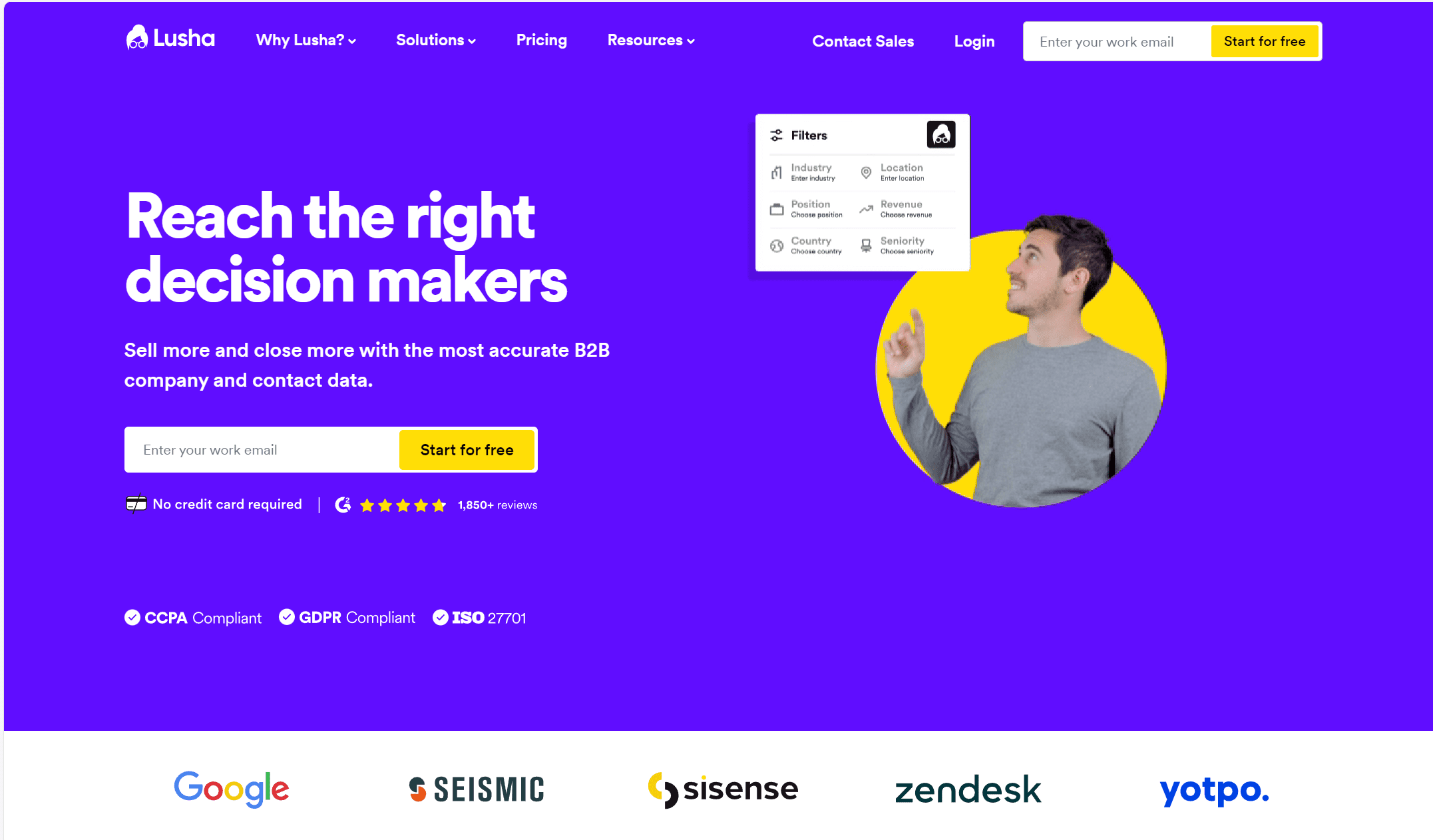
Lusha is a powerful data-enrichment tool for B2B (business to business) organizations. You can open it on LinkedIn, Sales Navigator, Recruiter, Salesforce, or any company site to instantly access your prospect’s contact details and B2B company info in seconds. This includes phone numbers, email addresses, and potential leads and contacts with other businesses.
Essentially, Lusha is a database rammed full of useful data, just waiting for you to take advantage of it. Lusha’s services are often used by sales and marketing professionals to streamline their outreach efforts and improve the quality of their leads.
The goal for Lusha is to provide accurate and up-to-date contact information so that your business can save time and increase the effectiveness of your sales and marketing campaigns.
Here’s a brief overview of how simple it is to get started with Lusha.
What Makes Lusha Stand Out?
Lusha has several powerful features.
- A prospecting platform that empowers you to search for contacts via specific fields, such as company name, location, revenue, industry, and more.
- Integrations with your CRM of choice allow you to take contact enrichment beyond LinkedIn and push your contacts directly to your CRM.
It’s possible to enrich your potential opportunities on Salesforce or Hubspot without ever leaving the platform. - The bulk enrichment feature provides you with the capability to enrich the data for up to 25 contacts at once from your Sales Navigator account. You can save these contacts to your Lusha lists or directly to your CRM.
Lusha Pros
- Accurate data: Generally high quality contacts and accurate information.
- Integrations: Lots of third-party integrations that make it easy for you to streamline your work.
- Ease of use: Chrome and LinkedIn plug-in is easy-to-use.
Lusha Cons
- Expensive: Can be a little pricey for what you get in comparison to Lusha alternatives.
- Relatively Basic: None of Lusha’s features are particularly mind-blowing.
How Much Does Lusha Cost?
Lusha has several paid plans. You can sign up for free and get 5 credits per month and access to the core features. For $29 per user per month, billed annually, you’ll get 480 credits per month and a few extra features like list management and list export.
The Premium Plan comes in at a whopping $51 per user per month for 960 credits per user per month. With this plan, you also unlock basic usage analytics and the ability to enrich in bulk (25 contacts at a time).
Finally, if you want to use Lusha’s Scale Plan, you can contact them directly.
The Top 5 Lusha Alternatives
So now we’ve taken a look at Lusha, we can see that it’s a good tool that gets the job done. But is it giving you the best bang for your buck, or are there some Lusha competitors that give more for less? Let’s find out.
1. Apollo
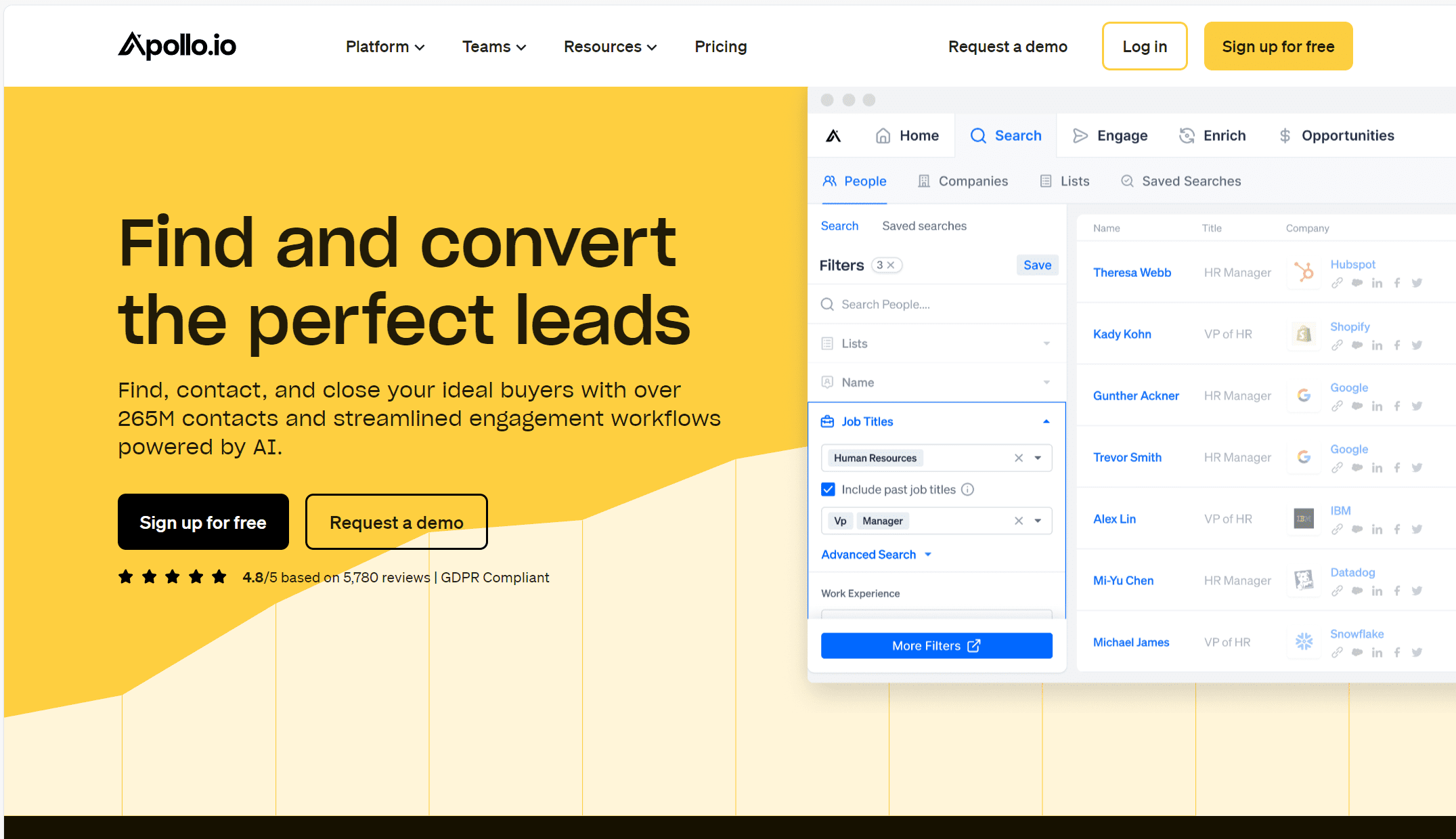
Similar to Lusha, Apollo is a comprehensive sales engagement and intelligence platform designed to help businesses with their sales and marketing efforts. It’s a great tool to use to automate LinkedIn scraping for contacts and set up an emailing campaign.
Apollo has an astonishing 5,659 5-star reviews on G2. In short, it’s one of the Lusha alternatives that can do everything that Lusha can do, as well as more. It covers data enrichment, lead generation, sales engagement all in one easy-to-use platform. It tends to lean towards catering for bigger businesses, but it’s not completely out of the realm of possibility for a small business to make use of Apollo, too.
Apollo Pros
- Personalized and automated: It’s a sales engagement powerhouse that offers email tracking, cadence automation, and personalized outreach.
- Accuracy: Apollo offers accurate and up-to-date information about companies and contacts.
- All-in-one: Campaign management is possible from within the platform.
- Integrations: Tons of integration options, including various CRM platforms, as well as plenty of sales and marketing tools.
- Free plan: Great free plan to try out the tool.

Apollo Cons
- Complex: It’s a complex tool and can be difficult to use if it’s your first foray in the data enrichment tool world.
- Expensive: Can be expensive compared to other Lusha competitors.
Apollo Pricing
Apollo’s pricing is considerably higher than Lusha’s, although it’s worth noting that its platform is a lot more comprehensive and its 5-star reviews speak for themselves.
The free plan offers a mighty 10,000 free email credits. You can get the LinkedIn extension, send 250 emails per day, and even integrate with Zapier all without spending a single cent. The free plan includes plenty of other features too. You can see them all in detail here.
The Basic Plan is $49 per user per month, billed annually, It offers more mobile and export credits, as well as plenty more integrations. It allows you to select up to 10,000 records at a time, instead of the standard 25 (which is the maximum for Lusha). You can also get a 14-day free trial for this plan and the Business Plan.
Talking of which, the Business Plan will set you back $79 per user per month. As well as everything in Basic, and extra credits, you also get A/B testing, AI-assisted email writing, and call recordings. The Business Plan also unlocks Conversations – an AI-powered conversation intelligence that provides you with insights straight from your video calls. However, as you’ll find out in a moment, it’s not necessary to get the business plan to receive this…
Finally, the Organization Plan is $99 per user per month which dramatically increases the limits of all features and adds call transcriptions among other things.
Apollo vs Lusha: The Verdict
Apollo is a far more comprehensive tool than Lusha. There’s no need to go into all the details again, but put simply, Apollo is better in almost every way.
However, that doesn’t mean that Apollo is the best Lusha alternative for you. There are a few reasons why you might still pick Lusha. First and foremost, Lusha is easier to use and has a far flatter learning curve. You can pick it up relatively easily, whereas Apollo has so many features that it can take weeks or months to properly understand some of them.
Like with everything, it completely depends on your business’s needs. If you’re a small business, Lusha might be all you need for now. If you’re looking for the elite, Apollo is the best choice.
Bonus Sales Tool: tl;dv
tl;dv is not an Apollo or Lusha competitor, but it is a powerful tool to complement whichever data enrichment and lead generation tool you use.
The beauty of tl;dv is that it records video calls, captures transcripts in more than 25 languages, and allows you to timestamp, edit clips into reels, and search your entire call library by keyword to jump instantly to the moments that you need. It’s the meeting management software that transforms your video calls into actionable insights, data-driven strategies, and ultimately, more sales.
As tl;dv is not a direct competitor to Lusha or any of the other platforms on this list, it’s a great complementary tool to use with them to create and store even more data that can enhance your sales strategies. Record your sales calls with tl;dv and send them straight to your CRM of choice to be placed alongside your prospect’s information. It can also work the other way too – get extra information on your leads and use it to enhance your sales calls.
How Much Does tl;dv Cost?
You can get unlimited recordings and transcripts without spending a penny with tl;dv. Not only that, but you can get started in mere moments too! tl;dv also offers AI-generated notes, summaries, and action points, making Apollo’s Conversations feature rather redundant – especially been as they’re charging $79 per month and it doesn’t come with all the nifty features of a platform dedicated to call recordings (like the ability to mash clips together into highlight reels, or timestamp important moments and tag your colleagues in!).
For the Pro Plan, you’ll pay just $20 per month and get all the top CRM integrations so you can funnel your insights from sales calls directly to your customer relationship management software. This also unlocks the reels feature, along with the ability to download calls and transcripts, and integrate with more than 5,000 other productivity tools.

tl;dv Pros
- Free AI Integration – Use state of the art AI to provide summaries, notes, and automatic speaker detection.
- Free and Instant Translations – Live transcriptions in 25+ languages for Zoom and Google Meet.
- Amazing Free Plan – Unlimited free recordings of Zoom and Google Meet calls.
- Easy to Use – tl;dv has an intuitive design that makes it super simple to use.
- Timestamps and Tagging Features – Timestamp your meeting highlights to quickly jump back to specific moments in the call. It also features the ability to tag colleagues at specific meeting moments so they get an email with a link straight to their inbox.
- Integrations – Push timestamps and meeting clips directly to Notion, Slack, HubSpot, Salesforce, and more via third-party integrations.
- Create Clips and Highlights – Highlight sections of the transcript to create clips out of recorded meetings.
- Intuitive Library – Search your meetings library for keywords in transcripts to quickly find what you’re looking for.
tl;dv Cons
- Compatibility – Not yet available for Microsoft Teams.
Whichever data enrichment platform you decide to go with, tl;dv is a no brainer to have by your side for sales calls (and internal calls).
Now, let’s see the rest of the Lusha alternatives.
2. Clearbit
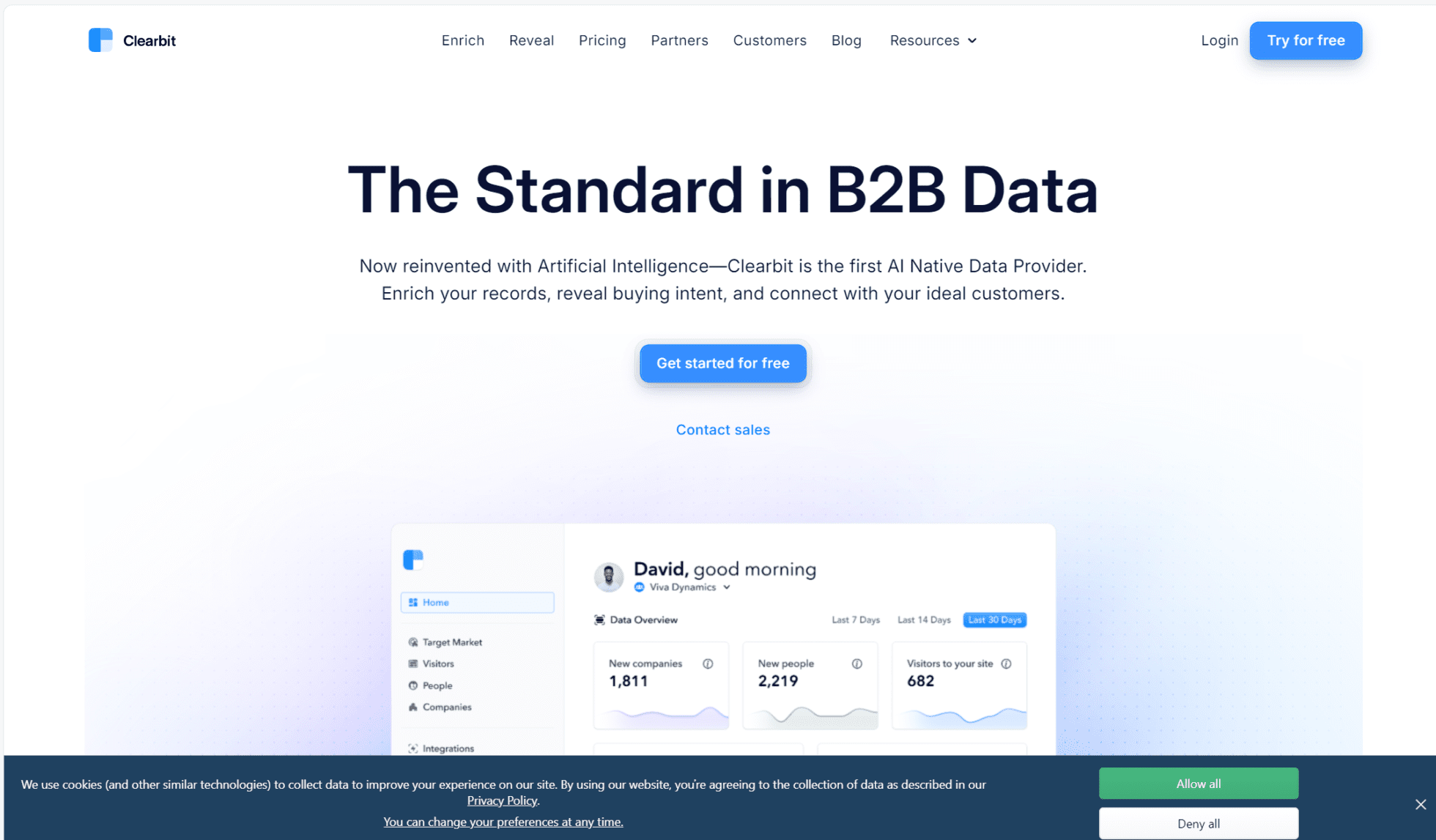
Clearbit is another data enrichment and customer intelligence platform that provides businesses with valuable information about their customers and leads. It helps organizations gather and enhance data about individuals and companies, allowing them to gain deeper insights into their customers and make more informed marketing and sales decisions.
One of its standout features is the ability to de-anonymize site traffic, transforming visitors into leads. Clearbit gathers public data from the web, their own proprietary data, and the power of LLMs to convert unstructured information into precise and standardized data sets. This provides a data foundation you can build upon. It’s also used by industry giants like Asana and Hubspot.
It’s certainly one of the best Lusha alternatives on the market, but is it the best for your needs?
Clearbit Pros
- Easy to navigate: Simple and intuitive layout.
- Integrations: Clearbit has lots of integrations to streamline your workflow.
- Emails: It’s easy to email prospects using Clearbit.
- Turns traffic into leads: Clearbit turns website visitors into leads with full company profiles.
Clearbit Cons
- Expensive: High prices can be a concern for small businesses.
- Inaccurate data: The phone numbers it provides can often be inaccurate.
Clearbit Pricing
Clearbit offers a free plan that offers some basic core features for you to try out, including de-anonymizing your site traffic and enriching domains and emails.
Unfortunately the paid plans’ price levels are hidden. You have to reach out to Clearbit directly to ask them for a quote. This is an unnecessary service and often means that they are more expensive than the rest of the market – though it’s not always the case.
Their flexible plan structure means you should be able to work something out that works for you, regardless of the size of your business.
Clearbit vs Lusha: The Verdict
Clearbit’s free plan is pretty decent, although specific limitations aren’t immediately visible. It has some great features that Lusha doesn’t have – like de-anonymizing your website traffic. This can be incredibly helpful and potentially nudge it above Lusha on its own.
Clearbit has an equally intuitive layout so you should have no trouble learning how to use it. Clearbit just pinches the win here if you’re only comparing it to Lusha.
3. Cognism
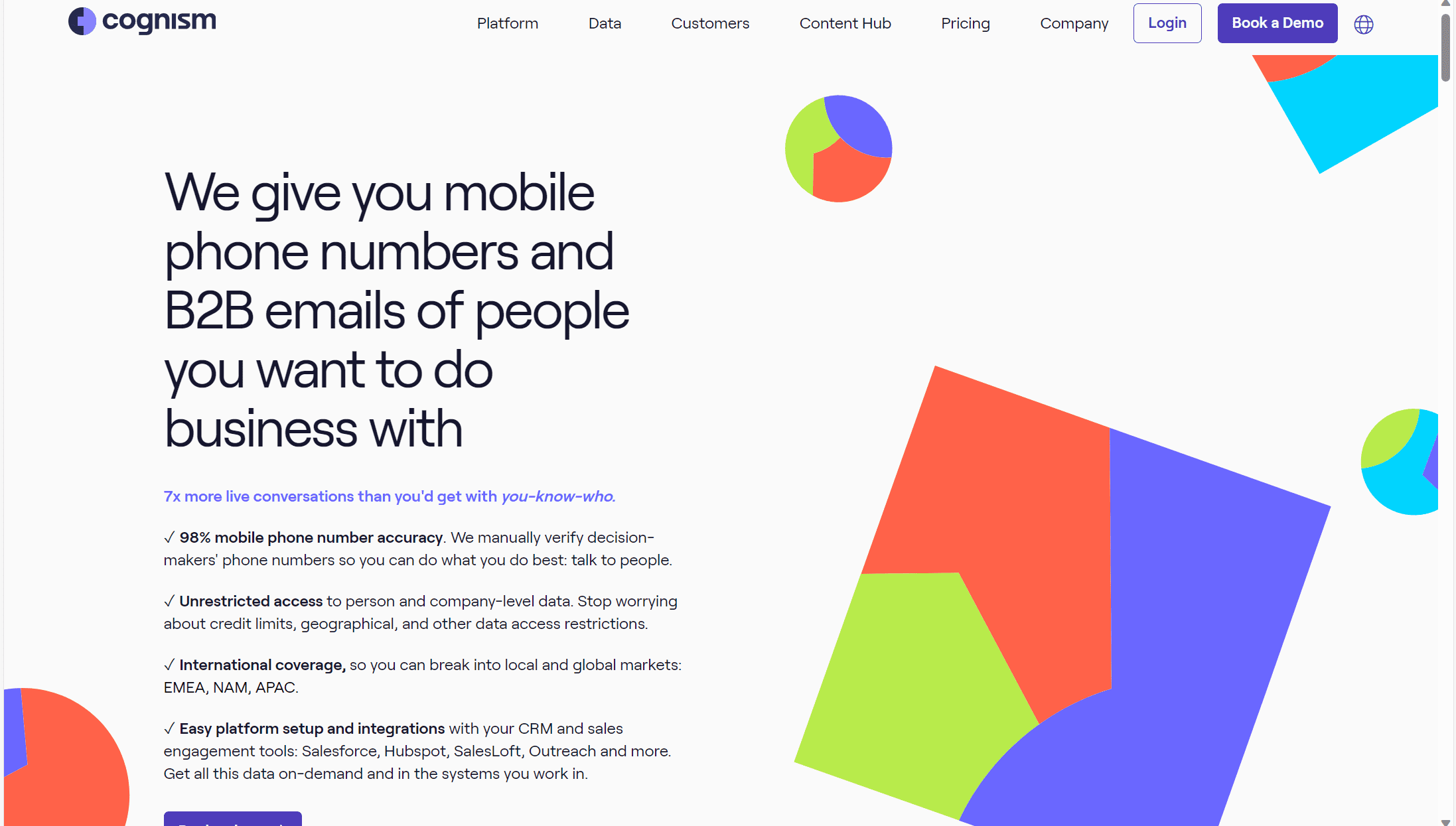
Cognism gives you the mobile phone number and B2B email addresses of the people that you want to do business with. Or at least, that’s what they claim. This Lusha alternative also claims to have 98% accuracy when it comes to mobile phone numbers. This is a helluva lot more than Clearbit and Lusha if the reviews are anything to go by.
Like other Lusha competitors, Cognism has tons of integrations so that you can streamline your workflow and keep using your current productivity tools. Cognism also takes the GDPR burden off your shoulders by scanning the Do Not Call (DNC) lists around the world and notifying you which prospects are on them.
Cognism Pros
- Data accuracy: Phone number accuracy is said to be 98%!
- GDPR Compliant: They advise you if the phone number is on a DNC list.
- International: They have a strong presence in Europe and work internationally.
- Data quantity:They have 70 million phone numbers internationally – more than 2x any other data provider.
Cognism Cons
- Learning curve: The learning curve can be a little steeper than you might like for a new tool.
- No free plan: Cognism doesn’t offer you a free plan to try out the features.
Cognism Pricing
Cognism, like Clearbit, requires you to reach out to them directly in order for them to tell you how much it costs. This is often an indicator that it’s above the market average for such a data enrichment tool – but not always. It does, however, put an obstacle in between you and getting started.
There is also no free trial. You can book a demo with a sales rep, but that’s all.
Cognism vs Lusha: The Verdict
Cognism is a stronger tool than Lusha, but its pricing is a mystery and there is no free option to test the waters. This can be quite frustrating, especially if you’re making a large commitment.
Lusha is also an incredibly simple tool to use, whereas Cognism is a bit more complex. This means it may take longer to learn how to best make use of the platform. Having said that, Cognism also has a much stronger database with way more phone numbers (and more accurate phone numbers, too).
All in all, it depends on what you want from your sales engagement platform. Simple and quick to get started? Lusha is your choice. Something serious that will get the job done on a deeper level? Cognism is your pick.
4. Hunter
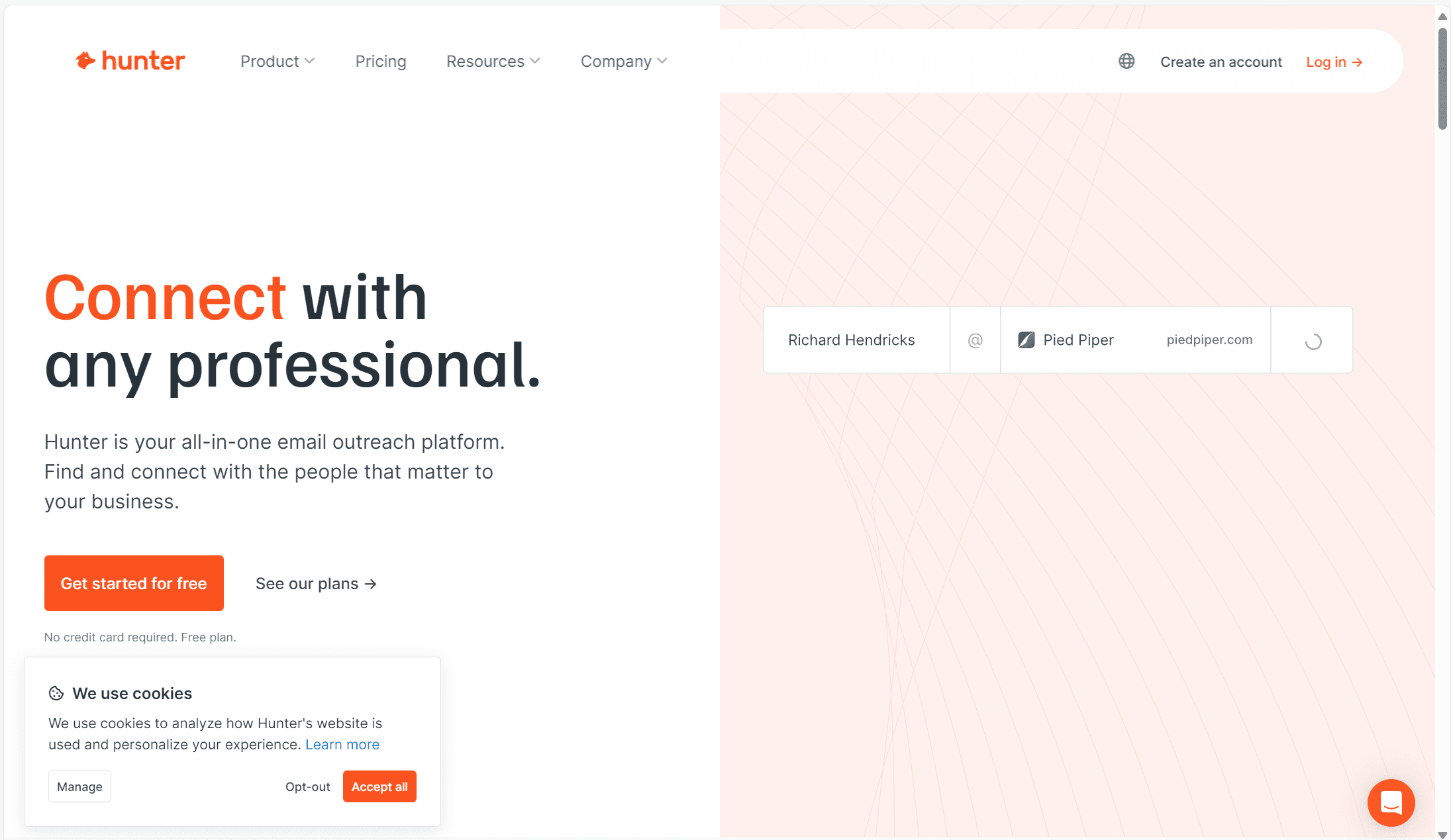
Hunter is designed to help you connect with any professional. It bills itself as an all-in-one email outreach platform that empowers you to find and connect with the people that matter most to your business.
Hunter uses a combination of proprietary technology and artificial intelligence to find, verify, and enrich contact details. It can put you in touch with decision makers almost instantly.
Like other Lusha alternatives, Hunter has an array of integrations with CRM platforms, Zapier, and you can even use their own APIs to sync your data all over the place. Hunter is also recognized as a transparent and compliant company that allows you to stay out of hot water.
Hunter Pros
- Email campaigns: Hunter is great for email campaigns – especially cold emails.
- Search via website domain: You can use Hunter to easily find emails from website domains.
- Email verification:They verify email addresses to protect your sender reputation.
- Ease-of-use: The extension is super easy to use.
Hunter Cons
- Limited data: They have limited data compared to other Lusha competitors.
Hunter Pricing
Hunter’s pricing is conveniently listed on their website. Their free plan only allows for 25 monthly searches and 50 monthly verifications. This isn’t the best, but it allows you to experience the user interface and get used to the tool before committing to a paid plan.
The Starter Plan comes in at 34€ per month. This unlocks 500 monthly searches and 1,000 monthly verifications. This also unlocks the ability to find emails via website domains. You can connect 3 separate email addresses and launch your email campaign to 2,500 people. With this plan, you also get priority support.
The Growth Plan is a hefty 104€ per month and greatly increases the numbers of everything in the Starter Plan. The Business Plan takes the limitations to an astronomical level, but the price is equally astronomical: 349€ per month.
Hunter vs Lusha: The Verdict
If you thought Lusha was expensive, then Hunter probably isn’t for you. However, Hunter offers a whole bunch of features that Lusha does not. For example, the ability to intuitively find emails directly from domains is a great feature that gives it a little oomph.
In comparison to other Lusha alternatives, Hunter is lacking the same levels of data. It falls behind a little in this regard, but also because it doesn’t have too many stand-out features.
5. RocketReach
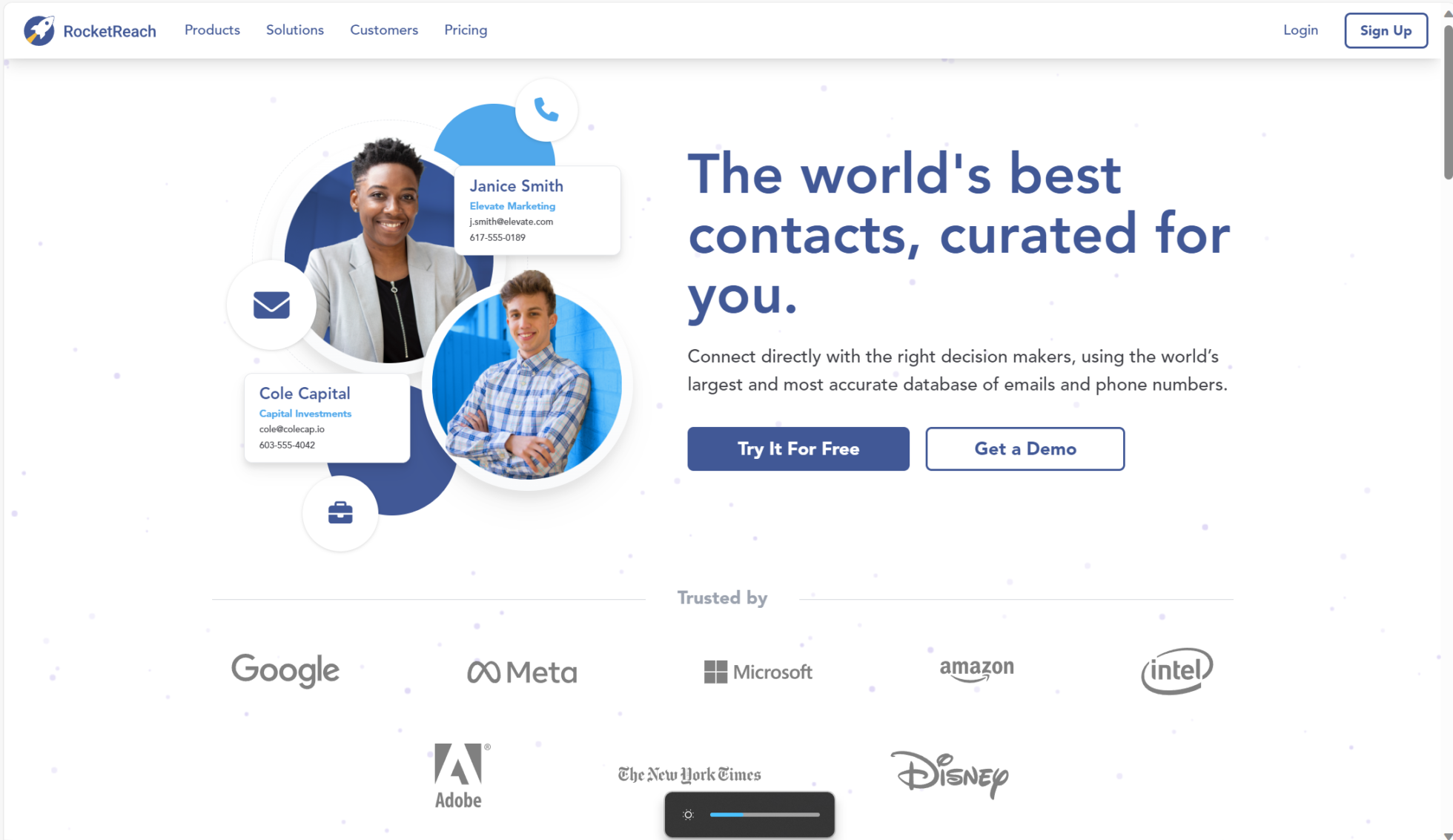
RocketReach claims to have the world’s best contacts curated for you. It’s worth noting that RocketReach doesn’t mess around when it comes to the companies that praise it either: Google, Meta, Microsoft, Amazon, Intel, Adobe, Disney… The list goes on.
Supposedly, RocketReach lets you connect directly with the right decision makers, using the world’s largest and most accurate database of emails and phone numbers. It comes as a browser extension that you can make use of to unlock and search 700 million profiles and 35 million companies by location, title, industry, company details and more.
You can also have bulk look-ups, meaning you can download thousands of prospects meeting your specific target criteria instantly. It integrates seamlessly with all your favorite CRM platforms and productivity tools, and you can use its APIs to power your own application.
RocketReach Pros
- User friendly: RocketReach provides a user-friendly interface for finding contact information.
- Trusted: RocketReach is trusted by 95% of the S&P 500.
- Lots of integrations: There are tons of integrations for you to use, as well as APIs for making your own application.
RocketReach Cons
- Expensive: RocketReach is considered expensive compared to some other Lusha alternatives.
- Compliance: Compliance with GDPR isn’t specifically highlighted on their website like it is with other Lusha competitors.
- Data coverage: Sometimes it can be difficult to find contact information for smaller companies or more niche markets.
- No free plan: RocketReach doesn’t have a free plan.
RocketReach Pricing
The Essentials Plan for RocketReach is 33€ per month. This only allows 1,500 annual lookups. The Pro Plan comes in at 68€ per month for 3,600 annual lookups. Finally, the Ultimate Plan is 171€ per month and nets you 10,000 lookups per year.
There is no free plan and the paid plans provide little more information than that.
RocketReach vs Lusha: The Verdict
All in all, RocketReach is a powerful platform, but it is not the best Lusha alternative on the market. It has no special or unique features yet it costs a lot more than Lusha does. Sure, it might be trusted by big industry names, but the lack of a free plan makes it difficult to know whether it’s the right choice or not before committing.
Which Lusha Alternative is Right For You?
Ultimately, you have to decide what your business needs and who will be using the new platform. If you’re looking for a comprehensive data enrichment machine, then Apollo is probably the best Lusha alternative on the market. It also has one of the best free plans so you can get started straight away.
Clearbit is a great Lusha competitor for those in the market for something simple and streamlined – it also converts website traffic into leads which is a nifty feature. Cognism, on the other hand, strides the gap between Apollo and Clearbit, finding some nice middleground in between. Hunter is similar to Clearbit in many ways, with the added capability of searching via domains, while RocketReach is the most like Lusha, only a lot pricier.
Whichever sales management platform you decide to go with, partner it with tl;dv to unlock data insights from your sales calls too. You can store them in your favorite CRM of choice alongside their up-to-date contact information.

